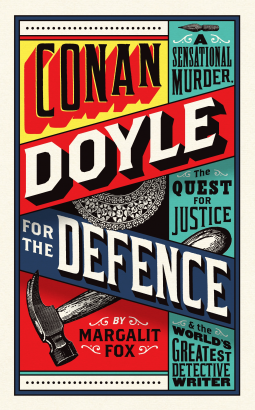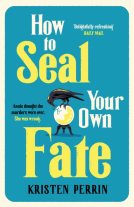
Conan Doyle for the Defence
A Sensational Murder, the Quest for Justice and the World's Greatest Detective Writer
by Margalit Fox
This title was previously available on NetGalley and is now archived.
Send NetGalley books directly to your Kindle or Kindle app
1
To read on a Kindle or Kindle app, please add kindle@netgalley.com as an approved email address to receive files in your Amazon account. Click here for step-by-step instructions.
2
Also find your Kindle email address within your Amazon account, and enter it here.
Pub Date Jun 28 2018 | Archive Date May 17 2018
Serpent's Tail / Profile Books | Profile Books
Talking about this book? Use #ConanDoyleForTheDefence #NetGalley. More hashtag tips!
Description
Arthur and George meets The Suspicions of Mr Whicher: how the creator of Sherlock Holmes overturned one of the great miscarriages of justice.
Just before Christmas 1908, Marion Gilchrist, a wealthy 82-year-old spinster, was found bludgeoned to death in her Glasgow home. A valuable diamond brooch was missing, and police soon fastened on a suspect - Oscar Slater, a Jewish immigrant who was rumoured to have a disreputable character. Slater had an alibi, but was nonetheless convicted and sentenced to death, later commuted to life imprisonment in the notorious Peterhead Prison.
Seventeen years later, a convict called William Gordon was released from Peterhead. Concealed in a false tooth was a message, addressed to the only man Slater thought could help him - Arthur Conan Doyle. Always a champion of the downtrodden, Conan Doyle turned his formidable talents to freeing Slater, deploying a forensic mind worthy of Sherlock Holmes.
Drawing from original sources including Oscar Slater's prison letters, this is Margalit Fox's vivid and compelling account of one of the greatest miscarriages of justice in Scottish history.
Available Editions
| EDITION | Hardcover |
| ISBN | 9781781253564 |
| PRICE | £16.99 (GBP) |
| PAGES | 320 |
Links
Featured Reviews
You can tell from the first page to the last page that the author thoroughly researched the story of Oscar Slater and Arthur Conan Doyle I find book to be very informative. I would definitely recommend this book to anyone who is a fan of the true crime genre or Conan Doyle .
What a fascinating book! Whilst reading it, I realised I had vaguely heard of the murder case but was unaware of the miscarriage of justice that had prevailed. It is truly shocking how this case was handled.
The book itself was a thorough examination of the case within the surrounding minutiae of late Victorian/early twentieth century society in Scotland. It allows the reader to get a feel for the paradox that was Conan Doyle, and of course, it wouldn't be complete without reference to his greatest creation, Sherlock Holmes. I would recommend this to anyone who likes historical true crime reads which explore the wider ramifications within society.
Thank you to Netgalley and publishers, Serpent's Tail / Profile Books, for the opportunity to review an ARC.
 Rosemarie C, Reviewer
Rosemarie C, Reviewer
A clear and easy to read narrative of the case surrounding Oscar Slater and Conan Doyle's involvement and efforts to fight a miscarriage of justice. The book gives readers an insight into the pervading prejudices of the time, the men involved, and to some extent the great fictional detective himself.
 Susan R, Reviewer
Susan R, Reviewer
Arthur Conan Doyle is, of course, best known for writing Sherlock Holmes, but he was also a man of many interests. By the time of the events of this book, Conan Doyle was well known as a crusader for justice; although he was also somewhat derided for his passion for Spiritualism. However, if you are reading this book solely for your interest in Conan Doyle, then please be aware that this is largely about the historical true crime case, which occurred in Glasgow, 1908, and the events which followed it. The book does include Conan Doyle’s part in these events, but there is much more besides.
The case of Oscar Slater, a German Jew, who was cosmopolitan and well travelled, was certainly to regret his visit to Glasgow. In what was later termed, “the Scottish Dreyfus Affair,” Slater was arrested for the murder of an elderly widow, Marion Gilchrist, just before Christmas in 1908. This miscarriage of justice is more interesting, in part, because Slater himself is not a particularly sympathetic character. He was, in fact, a rogue, or ‘blackguard,’ in Conan Doyle’s opinion. However, the evidence against him was circumstantial and when he was sentenced to life ,with hard labour ,at the notorious Peterhead Prison, he began to lose hope.
Conan Doyle was interested in the case from the beginning, but a smuggled message from Slater in 1925, led to him becoming involved in trying to gain Slater’s release. It is more commendable that Conan Doyle worked on Slater’s behalf, considering his original low opinion of the man – it was justice that mattered and he threw himself into the investigation of the crime. This is a fascinating account of the crime, the background, original investigation and Conan Doyle’s own investigation. It is somewhat shocking to realise how long Oscar Slater spent in prison before his release; which may never have happened without Conan Doyle’s help.
At times, it seems the author wanted to put in every piece of research. However, this is still a fascinating account of a historical true crime and the outcome for the man convicted of it. I received a copy of this book from the publisher, via NetGalley, for review.
I enjoyed this book - a real insight into the mind and non-literary life of Arthur Conan Doyle, creator of Sherlock Holmes. Conan Doyle follows a number of miscarriages of justice and works methodically through the evidence to assist the wronged; this book concentrates on the story of Oscar Slater, a German Jew, wrongly jailed to hard labour for nigh on twenty years. Conan Doyle persists his case and eventually justice prevails. Fascinating.
 Paromjit H, Reviewer
Paromjit H, Reviewer
Arthur Conan Doyle takes on the mantle of his own fictional detective, Sherlock Holmes, in the true crime case of an innocent man, German Jew Oscar Slater, convicted of the murder of the rich, elderly, unlikeable 82 year old woman, Marion Gilchrist in 1908, in Glasgow. Margalit Fox gives us a dense study of the true crime with her impeccable research, concentrating on giving us a social and political commentary of the era that allowed such a damning miscarriage of justice to take place. It is a time of baseless, offensive theories claiming that criminals were born, not made. As such, they make the unfounded assumption that foreigners, the poor, the working class, all outsiders, and Jews are all criminals, ironic given that evidence suggests the real killer is none of these. Conan Doyle challenges such bigotry with the more rational and forensic approach to ensure that almost 20 years later, Oscar Slater is freed from Peterhead prison.
The police barely carried out an investigation, they had found a likely culprit in Oscar Slate, he indulged in gambling, lived with a prostitute, and travelled to New York within days of the murder. The fact that he had an alibi, bore no likeness to the man seen outside of Gilchrist's home, cuts no ice with the police. The policeman who queried his guilt loses his job as the police engage in outright deception and lies that ensures Slater is found guilty. Slater asks Conan Doyle for help in a message smuggled by William Gordon, a convict released in 1925. Despite not liking Slater, Conan Doyle continued to campaign until he was released. Slater displays little in the way of gratitude as he entered into a public spat with Conan Doyle on leaving prison. The police never pursued the real killer, despite evidence suggesting it was someone close to Gilchrist.
Fox does not dwell in length on Conan Doyle, giving us his personal history and his campaign to free Slater. She is much more interested in the anti-semitism, racism and demonisation of the poor in the period, encapsulated in the credence given to quack theories that justified this appalling state of affairs. I found this a compelling and interesting read of this true crime and the depiction of a corrupt police force is forcefully related. It is to his credit that Conan Doyle had an interest in justice and prepared to fight the establishment when it came to Slater. Many thanks to Serpent's Tail for an ARC.
 Janice B, Reviewer
Janice B, Reviewer
What a fascinating book. It delivers a true crime “mystery “ solved by the great Conan Doyle (creator of the famous Sherlock Holmes) presented within the social context of Victorian England. I enjoyed this very much - it was engrossing and certainly well-written.
My thanks to NetGalley for providing me with an arc in exchange for my honest review.
 Karen O, Reviewer
Karen O, Reviewer
Conan Doyle for the DefenceIn 1908, an 82-year-old spinster, Marion Gilchrist, was found bludgeoned to death in her own Glasgow home. The police soon had who they believed was the culprit – a German Jew called Oscar Slater. Despite having an alibi, Slater was convicted and sentenced to death before having his sentence commuted to life imprisonment in Peterhead Prison. Seventeen years later, William Gordon, a fellow inmate, was released, taking with him a smuggled message from Slater to someone who he thought could help him to clear his name – the writer Arthur Conan Doyle. This is the story of how the Sherlock Holmes writer helped to free the man who had become the subject of a huge miscarriage of justice.
In recent years, mainly thanks to the BBC Sherlock series, there has been a renewed interest in the work of Sir Arthur Conan Doyle. The TV adaptation of Arthur and George by Julian Barnes also introduced the public to how, although Sherlock Holmes was a fictional character, Conan Doyle was certainly not and, he too, dabbled in detection.
Conan Doyle for the Defence has police corruption, ineptitude and racial prejudice at its core. Shortly after the elderly woman’s murder, those responsible for finding the culprit had their sights firmly set on Oscar Slater. Despite him having an alibi, having no knowledge of the dead woman and there being no evidence whatsoever, Slater was arrested, tried for her murder and subsequently sentenced to death. This was commuted to life imprisonment and he would spend the following decades incarcerated in one of the toughest prisons in Scotland. Conan Doyle would spend many years trying to help to free him and even published The Case of Oscar Slater in 1912.
It is clear that the author has done much research into the case and, as a result, has provided a comprehensive overview of the trial, incarceration and release of Slater. The transcriptions of correspondence between himself and his family were particularly moving and really brought home how his family, themselves suffering due to the First World War, never gave up hope that, one day, justice would finally prevail.
I found Conan Doyle for the Defence a fascinating read, leaving me with a sense of despair that the justice system allowed this to happen. Highly recommended to those who enjoy reading true crime and any Sherlock Holmes fans.
 Cleo P, Reviewer
Cleo P, Reviewer
Conan Doyle for the Defence was a real treat for someone who loves historical true crime and into the bargain I got to know a little more about the creator of Sherlock Holmes.
The true crime is the brutal murder of Marion Gilchrist. A wealthy elderly spinster who lived in a secure apartment, almost paranoid about her precious jewels being stolen. She was pretty much estranged from most of her family and lived with her maid Helen Lambie in a tightly organised fashion as you’d expect from a woman of her class. On 21 December 1908 Helen Lambie left the house to buy the paper and by the time she returned a little more than ten minutes later, her employer was dead. Fortunately Helen, along with the downstairs neighbour had caught a passing glimpse of the murderer and she was also able to identify a missing diamond crescent-shaped brooch.
The police were involved and from the passing of time it is clear to see that the man they pursued, a Jewish man called Oscar Slater, was done for all the wrong reasons. Margalit Fox takes us through the anti-Semitic sentiment of the times and the fear of those immoral trades which Oscar also seemed to be caught up in.
The author also treats us to an explanation of how easy it is to identify the wrong man, especially if the police kindly give some clues as to who they think is the perpetrator of a crime.
To cut a long, but interesting story short, Oscar Slater is convicted of murder and Conan Doyle became interested in the case, but equally interestingly, he didn’t rate the man himself. The author then draws parallels between Conan Doyle’s work as a doctor and the skills needed to solve a crime. Working back from what is known, the symptoms or the body through the absolute facts. Something that didn’t happen with the police work carried out in Glasgow when Marion Gilchrist’s body was found! There are also parallels between Conon Doyle’s deductive skills (I’m not going to mention the lengthy explanation on how he actually practiced abduction) and those of his fictional detective which the author ascribes to his mentor at medical school who used his own keen observations to work out a person’s profession, address and other details from the mud on his shoe or the amount of lint on his hat.
I was absolutely fascinated by this read, there was a lot of information and one couldn’t help but wonder how Oscar coped with nearly two decades of being in Petershead prison with his family far away in Germany. When you consider he had no correspondence with them for the entirety of the WWI his fortitude is even more astounding.
Of course any book of this nature can if care is not taken to take an incredulous tone, it is after all easy to be wise at this distance of time, but the author did keep any such observations relevant to the time of the crime, relaying the disquiet of the wider public once the initial hysteria had died down. All in all this was a sad episode in criminal justice and it is thanks to Conan Doyle that the case was re-examined. Interestingly Oscar Slater was one of the reasons that the appeals court was set up. One of many, many interesting facts I learnt from Margalit Fox!
I’d like to thank the publishers Profile Books for allowing me to read an advance copy of Conan Doyle for the Defence which was published on 21 June 2018.
First Published UK: 21 June 2018
Publisher: Profile Books
No of Pages: 344
Genre: Non-Fiction
Amazon UK
Amazon US
Readers who liked this book also liked:
Nigel Henbest; Simon Brew; Sarah Tomley; Ken Okona-Mensah; Tom Parfitt; Trevor Davies; Chas Newkey-Burden
Entertainment & Pop Culture, Humor & Satire, Nonfiction (Adult)


















